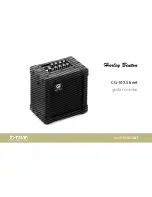
RV-1 Real Reverb User’s Guide
Congratulations on your purchase of the Real Reverb, the spring reverb for the digital age. For the first time a high
quality real spring reverb is available for professional sound recording. The Real Reverb employs innovative new
circuit technology with two Accutronics, classic, full size, 6 spring reverb tanks. The result is all the great sound of
analog reverb without the problems usually associated with them.
The unit features two channels, each with its own reverb tank. Channel one has a short decay time and channel two
has a longer one. Each channel can be run separately or they can be linked. The unit has reverb phase and low cut
filter switches, as well as, input sensitivity, overload indicator, mix and output level controls for each channel. The
circuit features an innovative design that for the first time keeps the frequency response of the drive and receiv
-
ing transducers flat and the noise is lower than ever. The inputs and outputs are fully balanced, three pin or TRS,
using Analog Devices 2142 and 2143 audio devices. The power supply is fully regulated at plus or minus 18 volts
for maximum head room and quick transit attack and it uses a custom built, shielded, toroidal transformer for low
noise. Each Accutronics reverb tank is individually shielded with mu metal to reduce noise from stray magnet fields.
Only the finest components are used for the highest quality reproduction.
CONTROLS
Phase: this control reverses the phase of the effected reverb signal. Use this control when the reverb is being mixed
evenly with the dry signal or when the outputs are linked, results in a bright sparkle in the reverb sound.
Filter: a high pass/low cut filter for the effected signal. Removes rumble and low frequency noise from the effect.
Overload indicator: red LED will turn on when the input signal is overloading. A little flickering is fine but keep the
levels down where the light is not on all the time.
Input Control: controls the input level to the unit and is used to stop overloading. To insure optimum signal to
noise ratio, make sure this control is turned up as high as possible before clipping.
Mix Control: controls the ratio of dry to wet (effected) signals at the output.
Input Link Switch: mixes (combines) the input signals from both input channels. If one input is being used this will
distribute the signal to both channels (note as this is a mix circuit there will be a 6 dB loss in this mode,
turn up the input levels as needed).
Output Link Switch: mixes (combines) the output singles of both channels of the Real Reverb. Makes a complex
reverb sound with multiple reflections changing the phase of one of the reverb channels is most effective here. This
setting also reduces EMF noise by combining the reverb transducers in a humbucking configuration.
WARNING: connection to anything with phantom power will damage the unit!
Never use this unit around strong EMF fields. Noise in the signal will result!
6990 Kingsbury Road | Templeton, CA 93465 | 805-461-4100 | http://www.demeteramps.com/



















